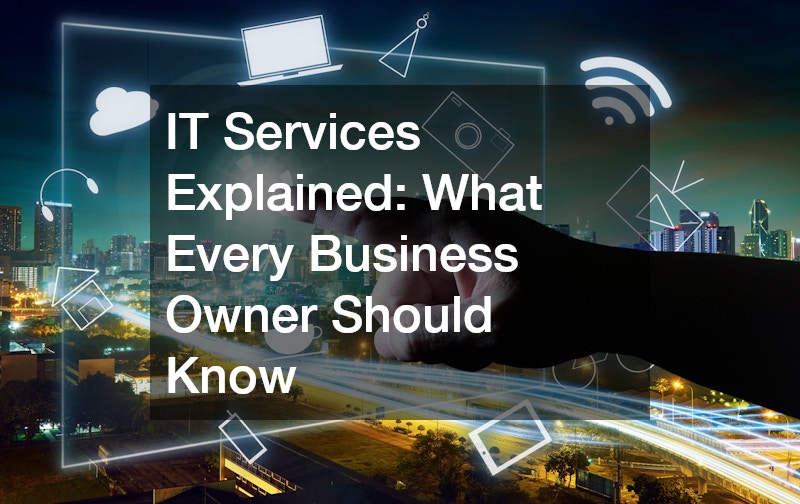In today’s digitally driven world, understanding and leveraging IT services is crucial for the success of any business. As technology evolves, so do the capabilities and complexities of IT systems that support business operations.
This article will explore the essential aspects of IT services every business owner should know, providing insights into how these services can help drive growth, efficiency, and security in your operations.
Understanding IT Services
IT services encompass a broad range of functions that support the technological infrastructure of a business. These services can include everything from network management and data storage to cybersecurity measures and software support. For business owners, understanding the scope and scale of IT services is critical in ensuring that their business operations run smoothly and efficiently.
The role of IT services is not just limited to maintenance and troubleshooting. They are integral to strategic decision-making, enabling businesses to utilize big data analytics, cloud computing, and other advanced technologies. This integration helps businesses innovate while maintaining a competitive edge in their respective markets.
As businesses grow, the demand for sophisticated IT services also increases. Choosing the right IT services that align with business objectives can significantly impact overall productivity and profitability. Hence, business owners must stay informed about the latest trends and advancements in IT to make informed decisions.
Reviewing the Importance of Managed IT Services
Managed IT services have become a popular choice for many businesses looking to optimize their IT capabilities. These services provide comprehensive management of an organization’s IT infrastructure, allowing business owners to focus on core activities while experts handle technical issues. The cost-effectiveness and reliability of managed services make them an attractive option for businesses of all sizes.
One of the key benefits of managed IT services is their ability to proactively monitor and maintain systems, minimizing downtime and preventing potential issues before they escalate. This proactive approach ensures that systems are always updated and secure, providing peace of mind to business owners. Additionally, managed services can be tailored to fit the specific needs of a business, ensuring that resources are allocated effectively.
Outsourcing IT needs to a managed services provider (MSP) also means access to the latest technologies and skilled professionals. This access ensures that businesses remain at the forefront of technological advancements without significant investments in in-house IT teams. With an MSP, companies can scale their IT resources according to their growth, ensuring flexibility and adaptability in an ever-changing business environment.
Implementing Cybersecurity as Part of IT Services
In today’s digital age, cybersecurity is a critical component of IT services that no business can afford to overlook. With cyber threats becoming increasingly sophisticated, businesses must implement robust security measures to protect sensitive data and maintain customer trust. Cybersecurity services can include everything from firewalls and encryption to regular security audits and employee training.
Effective cybersecurity measures not only protect against data breaches and cyberattacks but also ensure compliance with industry regulations. Many industries have stringent security requirements, and failing to meet these can result in hefty fines and reputational damage. Hence, business owners need to work closely with their IT providers to implement comprehensive security strategies that address potential vulnerabilities.
Moreover, the cost of recovering from a cyberattack can be significantly higher than investing in preventive measures. With the average cost of a data breach reaching millions, prioritizing cybersecurity services within the broader scope of IT management is both a financial and operational imperative for modern businesses. Ensuring robust cybersecurity measures means not only protecting assets but also maintaining continuity and trust with customers.
Using Cloud Services
The advent of cloud services has revolutionized the IT landscape, offering both flexibility and scalability for businesses. Cloud computing allows businesses to store and access data over the internet rather than relying solely on localized hardware. This shift not only reduces costs associated with maintaining physical servers but also enhances collaboration and accessibility among teams.
Many businesses are adopting cloud services to streamline operations and enable remote work arrangements. The cloud provides scalability, allowing businesses to increase or decrease resources as necessary without substantial investments. This flexibility ensures that businesses can quickly adapt to changing market conditions and technological advancements.
IT services play a fundamental role in the operation and growth of modern businesses. From managing day-to-day operations through managed IT services to safeguarding critical data with robust cybersecurity measures, these services are indispensable. As technology continues to evolve, being knowledgeable about IT services will empower business owners to make strategic decisions that drive efficiency, innovation, and competitive advantage in their respective markets.


